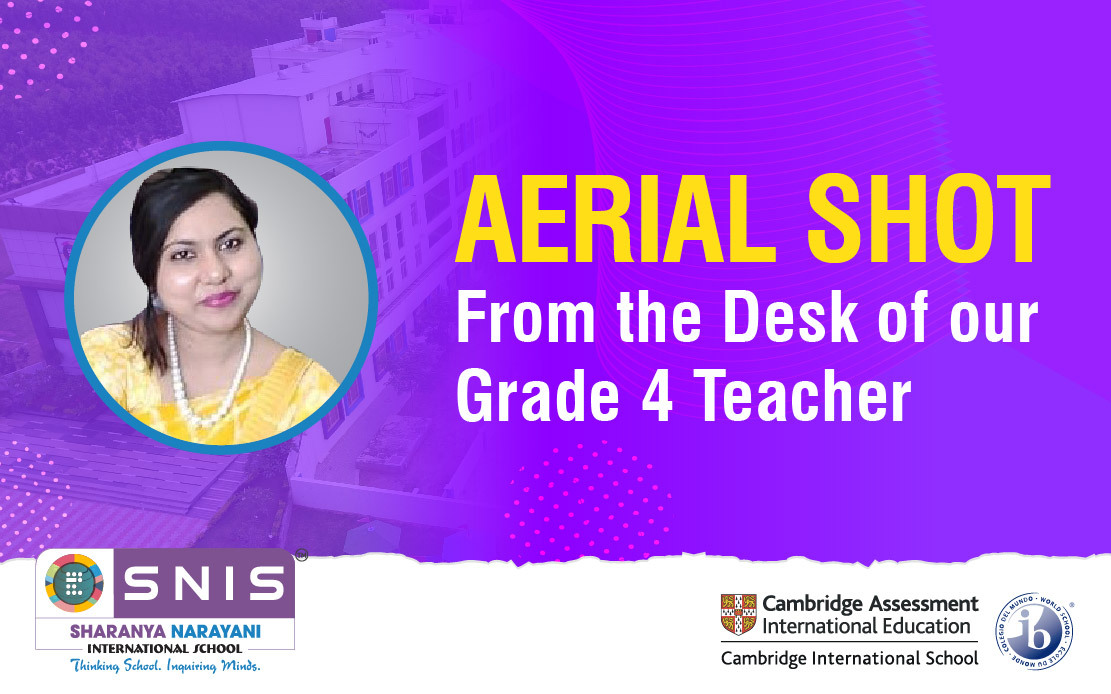
04 Feb Aerial Shot – From the Desk of our Grade 4 Teacher
How well does an international curriculum prepare children for the future?
Thanks to the expedited technology invasion in our daily life, driven by the ‘Fourth Industrial Revolution.’ We are at a breakpoint in history where, in the next 15 years, the world will change more fiercely than it has in the last 150 years.
In this evolving scenario, how does Sharanya Narayani International School (SNIS), one of the best international schools in Bangalore, prepare students to thrive in a transformed world with very different workplace requirements from today?
It’s been warned by thought leaders that children who are entering school today, will most likely work in careers that we have not yet heard of. They will therefore have to be equipped with skills that employers are seeking in their prospective employees.
In this context, collaborating with others across the globe to find creative solutions to complex problems; critical thinking and the ability to seek and create different types of information, allowing skilled judgment and decision making; an awareness and ownership of environmental stewardship and service orientation; negotiation and cognitive flexibility; and using technology to design, control and monitor situations will assume great significance in any endeavour to thrive in the workplace of tomorrow.
The international curriculum promotes a way of thinking that is research-based and evidence-informed; it is conceptual rather than knowledge-based, designed to provide teachers with autonomy to interpret it. It is geared towards encouraging students to develop and own the skills and capacities that employers in tomorrow’s workplace will look for in their prospective employees.
Students at SNIS, an IB School in Bangalore are encouraged to think, solve complex problems, ask insightful and challenging questions, and understand that no one answer is the right one. These are the very skills and capacities that are relevant to the 21st-century skills required in the future. These skills are practiced in everyday life in the international curriculum to ensure they are internalized. Teachers and school leaders at SNIS are encouraged to model the learner profile so that students, parents, and the entire community see it in action.
Rather than follow a teacher-led directed learning system, SNIS, one of the best international residential schools in Bangalore, enables students to co-create their own learning, to become self-motivated and lifelong learners. Emphasis is placed on engaging with people in an increasingly globalized, rapidly changing world while respecting differences and seeking to celebrate what we all value. Students are also deliberately encouraged to reflect on their sense of identity and belonging.
When they are engaged with learning resources from across the world, they are challenged to understand that people, their cultures, and values can be very different from their own – and that it is all right to be different. At SNIS, which is also a top boarding school in Bangalore, we lay the foundations for students to understand their own values, boundaries, and what matters to them before they move to all corners of the world.
Another important aspect of the international curriculum that is critical to the students’ deep understanding and mastery of subjects is the assessment system. As opposed to the high-stake examination system followed by the national curriculum, here at SNIS formative and summative assessment is used.
This allows assessment of the child on a regular, ongoing, and daily basis. It is much more robust because there is a clear link between educational objectives, learning outcomes, and assessment design, making it much easier to gauge a child’s performance and preparedness for college life and the future.
Students at SNIS also participate, along with the teacher, in setting the rubric for assessment; a high level of reflection is an important part of international programmes. It is an assessment that is truly meaningful in today’s world since it is aimed at the holistic development of the child, including the nurturing of a spectrum of skills. It is an assessment for learning and not simply an assessment of learning.
Research on different disciplines of learning from around the world also informs the changes that are made to the curriculum. It evolves continuously to both keep abreast of and shape a world that is transforming in a complex and multi-dimensional way by incorporating contemporary knowledge and practices to serve future generations to come.
I enjoy being an IB Facilitator, and lifelong learner and cherish being a part of Sharanya Narayani International School, one of the top international schools in Bangalore.
-By Mrs. Nuzhath Siddiqa



Sorry, the comment form is closed at this time.